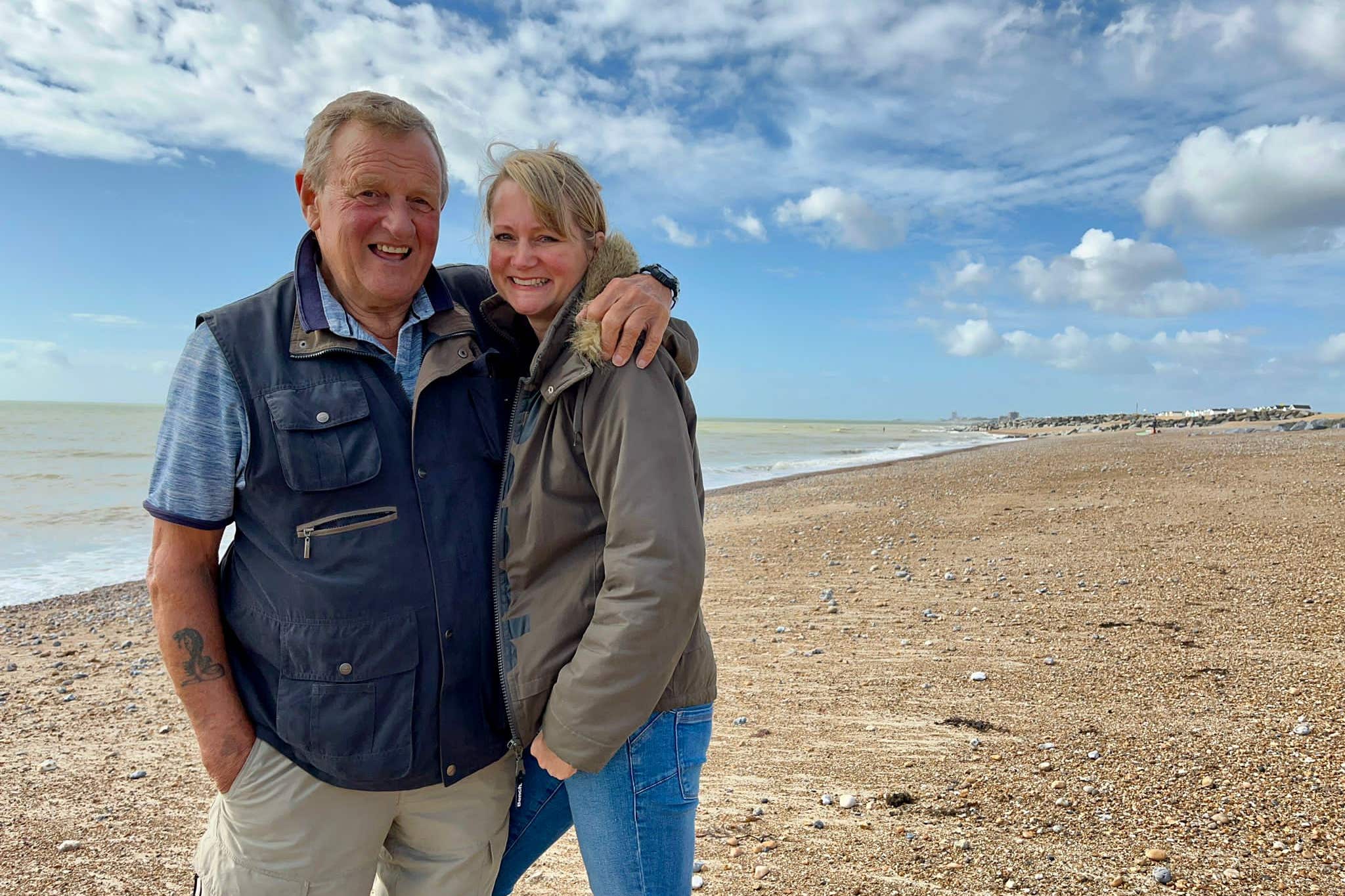Father and daughter duo on why this Sussex underwater kelp forest was worth saving
Eric Smith and Catrine Priestly speak to Yolanthe Fawehinmi about why it’s important to let nature breathe.

As an 11-year-old, Eric Smith used to go fishing with friends on the beach, but had no courage to swim out to sea – until one cold spring after buying a set of diving gear from Woolworths.
“There was beautiful white sand and I came across this big black area that was full of kelp,” Smith says. In those days, the kelp – large, brown algae or seaweed – spread from the West Country to Sussex, and had its own ecosystem – including at least 80 different species of snails and shrimps.
“It keeps everything alive, whilst also clearing the water incredibly fast. Kelp even stops storm surges. It was a beautiful thing to see, until it wasn’t.”
Whenever Smith, who is now 75, thinks about the damage pair trawling — where two fairly large boats are paired up with a very heavy net in between them, with metal runners along the bottom to catch fish — has done to kelp, “I get very sad, because there is a way to go fishing sustainably. It makes me quite emotional sometimes,” he admits.
In April 2008, Smith went for one of his regular free dives and saw the full extent of the damage being left behind by trawlers. “All you could see were tiny bream fish trying to rebuild their nest. It was heartbreaking,” Smith says, just before his voice cracks.
“I’ve kelp-dived for 63 years and it’s still a horror story when I look back on it. The bottom of the sea became void of life and the Sussex underwater kelp forest virtually disappeared. It’s like someone coming along to a farm with a big net and taking everything away. And not just the cow, sheep, and tractors, but the topsoil. That’s how bad it got.”
Since then, a 2021 bylaw – supported by Sir David Attenborough – banned trawl fishing in more than 100 square miles of seabed off Sussex. Smith had been campaigning since before the law came into effect – and he was later joined by his daughter, Catrine Priestley.
Their work has been documented in an episode of BBC One’s Our Lives, featuring footage of the rejuvenation of the Sussex undersea kelp forest, showing some amazing species returning to the UK, including stingrays, seahorses and rare angel sharks. But how did they go about doing this?
In April 2021 Smith and Priestley launched a Facebook group called Sussex Underwater, where they encourage locals to take part in citizen science — in partnership with the Sussex Wildlife Trust — and say if they have seen any kelp growing or washing up on beaches, including any kind of sea creatures. For instance ‘mermaid purses’, which are actually the egg cases of sharks and skates.
“It’s why we’ve encouraged people to put things like cuttlefish eggs back into the sea at a low tide. They often get washed onto shore because there is no longer a kelp forest they can use as a nursery ground. This gives them a bit of chance,” Priestley explains. “We are also filming the recovery as free divers and reporting our findings to the authorities. This helps us understand and get a hold of what’s coming back and how.”
Thanks to Smith’s bottom-of-the-sea knowledge, they knew exactly where to put weighted cameras. “We then back away from the cameras so the fish will not be frightened by us, and look from a distance,” Smith says. “We’ve got some footage of bream coming right up to the cameras, which is quite unique. It’s really nice to see them coming back, as they were some of the fish getting caught in the trawlers.”
Funnily enough, 44-year-old Priestley was never really much of a “water person” until she started looking and editing the footage being uploaded in the Sussex Underwater community group. “I started to really fall in love with the creatures — which is what we want other people to do — it made me want to get in the sea and meet them, and really understand what my dad has been in awe of after all of these years,” she says.
“It’s another world down there and was such a beautiful experience learning how to free dive with dad. When he held my hand and took me to the bottom, it was quite emotional. Also, my dad is a bit of a bionic man. He has two new hips and two new knees, so on land he doesn’t walk very well at all. But when my dad is in the water — his natural habitat — he just becomes a part of it.
“He cares so much about the environment and climate change, and that’s another reason why I wanted to do this with him. I want to make a difference, and now we can make that difference together. And it’s really lovely to be doing that as father and daughter.”
After campaigning for over 20 years and writing letters against trawling, Smith always knew that the Sussex underwater kelp forest would grow back. It started off with small mussel beds — where kelp grows — about the size of a tennis court. Then grew bigger in size and extended across 1,000 metres in the second year.
“But now, the mussels have gotten even bigger and the starfish can no longer eat them. It’s all happening. Nature just needed to be left alone so it could do its own thing, which is essentially what rewilding is all about. It’s brought me great joy seeing nature finally bring itself back to life.”
Our Lives on BBC One is out on September 8.
Bookmark popover
Removed from bookmarks